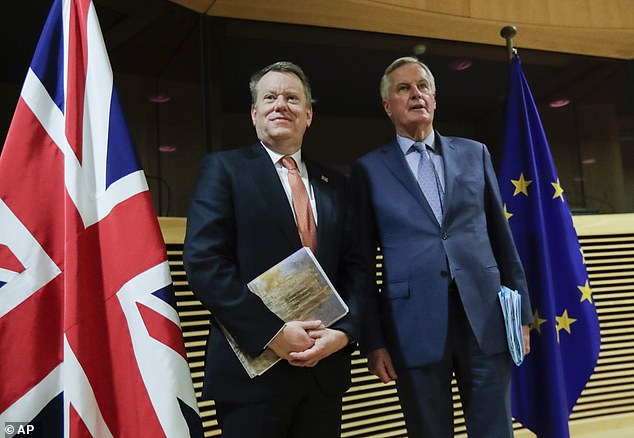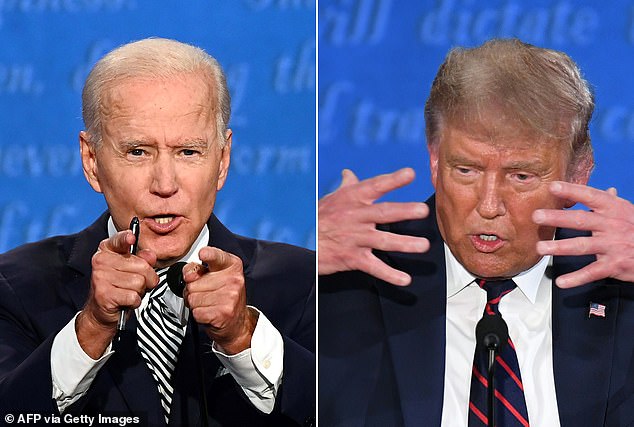The US election isn’t what matters most to markets, says ALEX SEBASTIAN: Ramped-up stimulus and China’s bounceback are the keys to kickstarting a global economic recovery
US politics, as is often the case, is driving markets at the moment as President Donald Trump and former Vice President Joe Biden go head to head for the White House.
The outcome this particular race is less important economically than another stateside political wrangle though.
A fiscal stimulus package somewhere in the order of $2trillion is imminent, whoever wins at the ballot box. This could put fuel in the rockets of the US economy as it recovers from the pandemic next year, and drag the rest of the world with it.
The outcome the race between Donald Trump and Joe Biden is being overshadowed by the prospect of a vast fiscal stimulus package
Whether the argument on its exact size and scope is settled just before or soon after the 3 November election won’t really matter.
Either way it will be key in how the US and by extension the rest of the world recovers economically from the virus-induced lockdowns of 2020.
Who wins the two-way race may have some impact though, given that markets tend to react better to tax cutters such as Trump winning than tax hikers – regardless of where the tax rises are targeted.
Investors, and the media, may be repeating the mistake of 2016 when large national polling leads for Hillary Clinton prompted many to believe her victory was close to certain.
Anything can happen in US politics, including a legal dispute over the result, but – and this assessment might break from the consensus – another Trump win looks the most likely outcome.
Polls in the the crucial swing states that will decide the race are close and most pollsters have a track record of significantly underestimating Trump’s real election day performance.
Whether the number crunchers have updated their methods effectively since 2016 is a very open question.
If markets have already priced in a Biden victory, another ‘surprise’ Trump win could provide impetus for the next leg up in US shares.

Back to work: China’s economy is back at full capacity after its shutdown early in the year
Either way, neither man will be shy in turning on the spending taps so we should see the US economy perform strongly in 2021 if the pandemic recedes as hoped.
On the other side of the Pacific Ocean, China’s economy has already started roaring back, if the official state numbers are to be believed. As ever, that’s an important caveat when gauging the health of the world’s second economy.
The fragile consensus seems to be that while the growth numbers are often massaged by the regime, they are at least linked to reality rather than plucked out of thin air.
In order to be sure they have a reasonable link to the true situation GDP figures can be crossed checked against things like energy production levels and freight movements, which can be independently verified.
Assuming the reported 4.9 per cent annualised growth is in the ball park of being true, it’s a major boost for not only China but the global economy.
As the US and Europe still languish in what is hopefully the latter part of the pandemic, Chinese workers are largely back to normal levels of activity. A strongly growing China could see the global economy bounce back better than is currently forecast.
Even with the Chinese dragon taking flight again and the US government about to hose the country in money, the global economy remains far from out of the woods, largely due to uncertainty over how long the pandemic will continue.
The biggest area of concern is clearly Europe, which was already much less economically vibrant than China and the US before the pandemic struck. Evidence of how nervous investors still are came this week in the form of the EU’s ‘coronabond’ auction.
Demand hugely outstripped supply, with investors putting up €233billion with only €17billion of bonds being issued, despite negative rates being on offer. Investors will pay 0.23 per cent to own the 10-year paper, rather than receive a yield.
In one sense this is good news for the EU as it can easily access the funding it needs for its own stimulus programme.
But the fact that the world’s central banks, pension funds and asset managers think paying to own bonds rather than being paid to hold them is a bargain tells you a lot about where money managers see the economy.

Deal or no deal? Expectations are rising that a sensible trade deal between the UK and EU will be done soon
Safe havens for cash are in exceptional demand, and paying 0.23 per cent for safety is better than paying 0.6 per cent, which is the rate on German bunds, a perennial favorite for the most cautious of investors. Particularly so if you expect European rates to go even further into negative territory.
There is another small chink of light for Europe in that the arduous four-year-long separation process between the UK and EU will end on 31 December one way or another, and a trade deal being put in place looks very likely despite all the posturing, bluffing and counter-bluffing.
Severing all free trade across the Channel over how many fish French fisherman are allowed to catch in British waters seems too silly to be a plausible outcome. But that doesn’t mean it can be ruled out entirely.

